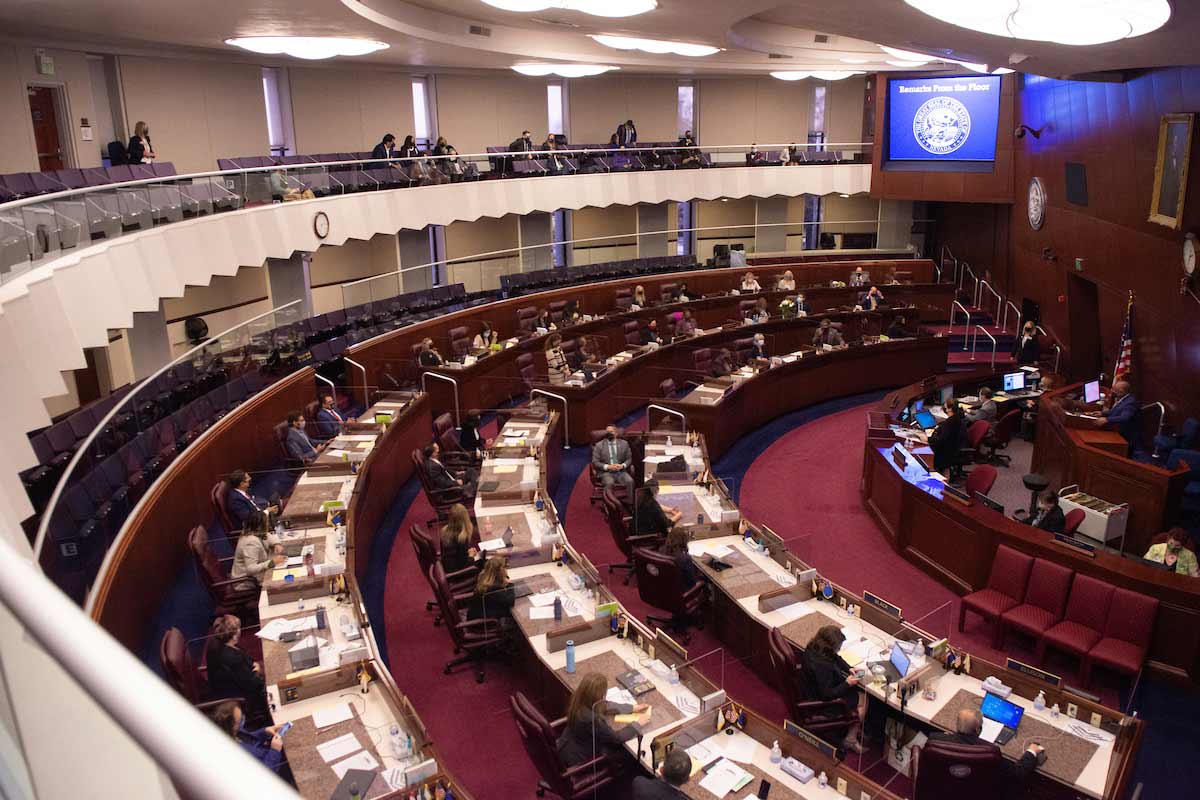 |
| A bill recently passed in Nevada will allow optometrists to negotiate better prices on services and materials for their practice by prohibiting vision care plans from requiring ODs to use their discounts. Photo: The Nevada Independent. |
Starting on October 1st, optometrists in Nevada will be able to offer their patients more affordable, convenient eye care thanks to Senate Bill 134, which was signed by Governor Joe Lombardo last week. The bill states that vision care plans can no longer require ODs to use their discounts on services, products and materials that they don’t cover. In other words, Nevada optometrists will now have the jurisdiction to choose the labs, services and materials that best suit the needs of their practice, potentially lowering out-of-pocket costs and allowing patients to use labs in-house or closer to home.
“This bill allows every optometrist to negotiate for the best price and best materials for their practice and patients,” says Jonathan Mather, OD, legislative chair of the Nevada Optometric Association (NOA). “Optometrists will be able to give patients better discounts than those that were mandated by vision plans for materials such as extra sunglasses or glasses/contact lens dual purchases.” Dr. Mather adds that the signed bill “should improve speed and quality of delivery of glasses and other services to patients and maintain a free and open market to help keep vision care costs down.”
The president of the NOA, Spencer Quinton, OD, remarks that the freedom for a practice to choose which labs to use will help many patients receive more timely care. He provides the example of a truck driver who breaks his glasses and would normally have to wait a week or longer to retrieve a new pair. “Under the new law, this individual would be able to use his benefit at an in-house or in-town lab that we can access to get him a new pair of glasses within a day or two, which is so much better,” Dr. Quinton points out. “Patients pay for these benefits, so they shouldn’t have to pay out-of-pocket and not use the benefit.”
Several Years in the Making
The first attempt to pass this legislation occurred in 2021, with advocacy efforts beginning several years before, though COVID-19 made it difficult to meet with legislators during that time. Even amid a pandemic and relentless pushback from the National Association of Vision Care Plans (NAVCP), in 2021, optometry was able to secure the victory of getting vision plans under the purview of Nevada’s state insurance commissioner.
“The first bill included provisions to require vision care plans to disclose the ownership of labs/materials to their beneficiaries and put these plans directly under the jurisdiction of the division of insurance, as it was previously unclear in Nevada law who complaints or violations would be enforced by,” says Dr. Mather. “The next session, 2022, we made more direct contributions from our PAC to leadership and caucuses, and Nevada saw a Republican governor elected with a majority Democratic Senate/Assembly. We continued to build relationships with key ODs and legislators, and our own Dr. Greg Koenig was elected to the Assembly.”
As part of the Assembly, Dr. Koenig was able to have frequent conversations with both parties about the issue. “A continuation of good relationships and a firm laying of groundwork meant that legislators were familiar with our issue,” says Dr. Mather. All of these outreach efforts, in addition to hiring an extra lobby firm and donating to both governor campaigns, is what he says “really helped us finish the fight and push our bill through this year.”
Dr. Quinton also harps on the important role that OD-legislator relationships played in last week’s signing of the bill. “You need the PAC money, but without the relationships, it doesn’t really matter how much money you have,” he says. “This time around, we really educated the different committee members on the concepts and importance of the bipartisan bill. We had co-sponsors from both parties who were understanding of the bill’s concepts, and it passed both houses unanimously.”
SB 134 was purposely modeled to complement the Dental and Optometric Care (DOC) Access Act, which proposes similar changes to vision plan regulations at the federal level through two current bills in the House and Senate (HR 1385 and S 1424). Efforts to pass the DOC Access Act—primarily led by the American Optometric Association, as well as various state associations—have been gaining momentum since 2015 as support from Congress continues to grow.
“This week, every state will be meeting with legislators in Washington to discuss the DOC Access Act,” notes Dr. Quinton. “We’re really trying to get support for that because it’s been building over the years with an increasing number of cosponsors, and eventually, hopefully, it will pass,” he says.
As for Nevada, the enacted law will take effect on October 1st for new contracts as well as those that renew after that date.
“With the right relationships, I think optometry can celebrate this win in Nevada, and hopefully it pushes the national legislature to move forward on similar issues,” Dr. Mather concludes.

